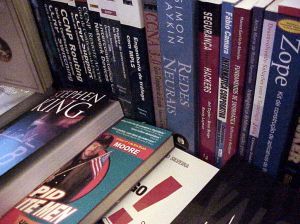Every writer – no matter what you write – needs an author biography to include under his or her byline. In a published book, the author biography usually goes on the back flap of the dust jacket, while article writers will typically see their biography at the base of their work. It is also important to send your author biography to potential publishers along with query letters, book proposals or manuscripts. It gives them an opportunity to get to know you – where you’ve been, what you’ve done, and what your goals are.
Third Person
Although this might be difficult for some writers, author biographies should always be written in the third person. In other words, you would say (about yourself): John Smith was born in Easely, South Carolina, and now resides in San Diego. Never write your author biography in first person – it sounds unprofessional and will mark you as an amateur. Besides, who wants to read an author biography that says, I was born in Kentucky and I really hope you enjoy my book?
Where You Live
Your author biography should state where you live and where you’re from. For example, if you were born in Houston, Texas, say so. However, if you live in a small town that no one is likely to have heard of, it is acceptable to say that you live in the closest major city. I live in Katy, Texas, which is twenty miles west of Houston, so my author biography states that I live in Houston. Your readers will want to know where you live, especially if you write novels based in your hometown.
Previously Published Works
Always include any previously published works that are relevant to the current work. For example, if you have written a book on beginning photography and you’ve published several articles in Photography Magazine, then you would include the titles of those articles in your author biography. However, if you’ve only published articles in Parenting, you should leave those out. Publishers and readers only want to know about previously published works that have to do with what you’re writing now in your author biography.
Goals & Aspirations
You don’t need to include your desire to have ten kids and forty-two grandchildren in your author biography, but your goals as a writer are perfectly applicable. For example, if you are hoping to write novels for young adults, you should put that in your author biography if it is relevant to your current work. Relevance is the key to your author biography; write things that are interesting to readers and publishers of the book or article you are trying to place.
Education
If you have an education, say so, especially if it includes a Master’s Degree or a Ph.D. Although all writers are not well-educated, it certainly won’t hurt if you are, and be sure to include the school from which you graduated. It is not, however, necessary to include your G.P.A. or the types of clubs and organizations with which you were involved. Listing the name of the school and the type of degree earned is sufficient for your author biography.
When You Have No Credits
If you’ve never published anything before, don’t say so; simply don’t mention your publishing history. It is much better to leave it out than to draw attention to the fact that you are a new and amateur author. Instead, focus on your education, your professional experience or other endearing qualities. Leaving out your publishing history might lead the publisher or reader to assume that you are inexperienced, but saying it flat-out will let them know you’re unpublished.
Be Brief
An author biography doesn’t need to be six pages long; in fact, it shouldn’t. Keep the author bio to a few paragraphs – five at most. If you’re not sure exactly what it should look like, read some of the author biographies included on the dust jackets of your favorite books at home. You’ll find that they are all pretty similar in length and context, which is how yours should be.
Writing your author biography shouldn’t be a major undertaking nor a source of undue anxiety. If you really don’t think that you’re up to the task, as a fellow writer friend to do it for you. He or she can interview you based on the information required for your author biography, then format it into a few paragraphs for you. This is a much better option than worrying about it for months, and you might find that the biography comes out better that way.
